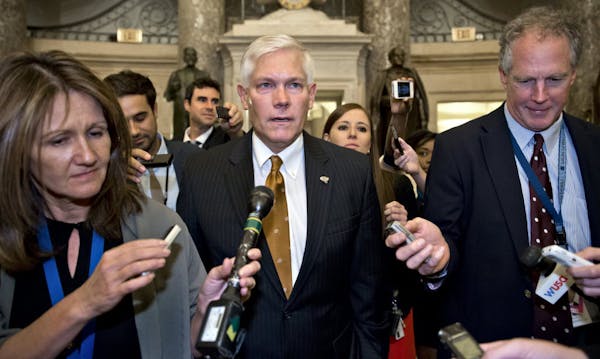Failure in Washington to reach a deal on the debt ceiling would force millions of senior citizens to contemplate a harsh new reality: Social Security checks not arriving on time.
And the longer the U.S. government is unable to borrow, the later those checks will be.
"I paid in for 53 years, and I saw that as insurance for when I had to use it," said Bob Geyen, 68, a retired teacher and school administrator from Shakopee. "It's just senseless what they're doing."
The U.S. Treasury has two big Social Security benefits payments due in the next three weeks — $12 billion on Oct. 23 and $25 billion on Nov. 1.
But if Congress and the White House cannot reach an agreement to raise the debt ceiling, the government will start running short of cash to pay its bills.
"They'll be short about a third of the dollars that they need to fund the federal government ongoing," said Jay Kiedrowski, a professor at the University of Minnesota's Humphrey School of Public Affairs.
The Treasury Department has argued for weeks that for technical and logistical reasons, it cannot pick and choose which bills to pay, since its cash flow varies each day.
It may be able to prioritize payments on the nation's debt to avoid a default, but all other bills would simply be delayed, said Paul Van de Water, a fellow at the Center on Budget and Policy Priorities.
"If the debt ceiling were not increased, those delays would get continually longer and longer, so that eventually you'd be running a month or two months behind," Van de Water said.
Social Security benefits, Medicare and Medicaid reimbursements, and federal employee retirement benefits are among the payments expected to be delayed if the gridlock in Washington continues into next week and beyond. Groups that represent older Americans are mobilizing.
The AARP sent a letter to President Obama on Monday, urging him to push for a quick resolution with Congress, because millions of older Americans rely heavily "or even completely" on Social Security and Medicare.
"It's being taken very seriously," said Amy McDonough, who tracks federal affairs for the Minnesota chapter of the AARP. "We're very concerned about what happens, during a default, to critical benefits."
Half of Americans on Social Security depend on it for 90 percent of their income, McDonough said, and the AARP is asking the president to make Social Security the top priority if Thursday's debt ceiling deadline passes and the Treasury Department is able to choose which bills to pay.
"They're not good choices," she said. "But for lots of people it is a matter of daily living."
Chuck Radke, 72, of Minnetrista, said it's getting difficult to figure out what's real and what's not. He assumes that delayed Social Security checks are unlikely, and he thinks politicians and the news media are playing games.
"At this point I don't think they will," Radke said. "But I guess anything's possible, and I've learned to work with the cards I've been dealt."
Deb Taylor, CEO of Senior Community Services, which serves more than 20,000 elderly people statewide, said that those her organization serves have been surprisingly unconcerned about the debt ceiling debate.
Low-income retirees are concerned about the government shutdown for a series of reasons, but they don't believe Congress will let the nation default or fail to meet its obligations to those collecting Social Security.
"They say, 'Oh, they'll work it out. They like to push it up to the last minute,' " Taylor said.
She said social workers should be able to rise to the occasion if Social Security checks are delayed or benefits cut, by finding emergency help with living expenses and energy costs.
"We believe that by working together with our partners we can put that safety net in place for a while," Taylor said.
But the threats to Social Security that seniors feel go beyond the worst-case scenario of late payments or a government default as a result of inaction in Washington on the debt ceiling.
Reduced cost of living increases may be on the federal docket before the end of the year. Those annual increases to Social Security benefits are now tied to the Consumer Price Index, but some, including President Obama, would like to tie them to a "chained" CPI, which takes into account the fact that consumers substitute lower-priced goods as prices rise.
The AARP opposes this, as does Bob Geyen, who says it reduces benefits as people get older. "They've had chances to make adjustments to this for several years and they've failed to do it," Geyen said. "That's the moral outrage to this thing, that it could have been much different than it is."
The more immediate possibility of a default would have implications for seniors beyond Social Security benefits.
"The public will react to Social Security benefits not being paid, but there's a larger amount of Medicare and Medicaid benefits," Kiedrowski said. "So are you not going to pay the hospitals and not going to pay the doctors?"
Since the government shutdown, Social Security, Medicare and Medicaid have continued to make payments without delay. That would change if Congress doesn't raise the debt ceiling, but no one's sure exactly how it would work out.
"One of the key things is this is uncharted territory," Van de Water said. "We hope that we never have to find out how any of this works."
Adam Belz • 612-673-4405 • Twitter: @adambelz
Bitcoin's latest 'halving' has arrived. Here's what you need to know
BNSF Railway says it didn't know about asbestos that's killed hundreds in Montana town
Tennessee Volkswagen workers vote on union membership in test of UAW's plan to expand its ranks
Here's how Phish is using the Sphere's technology to give fans something completely different

